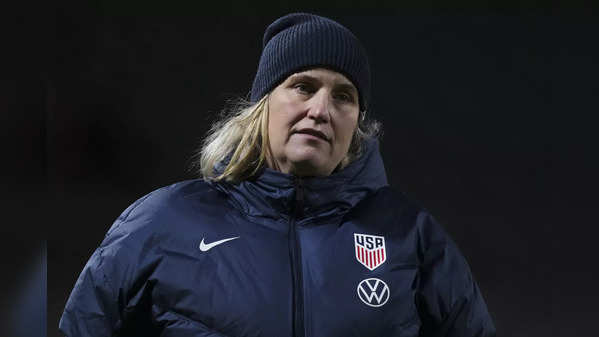Emma Hayes: transforming U.S. women’s soccer with vision and innovation

15-Jan-2025 12:20 AM
Emma Hayes, an Olympic gold medal-winning coach, is transforming U.S. women’s soccer through innovation, youth development, and empowerment. Focused on staying globally competitive, she’s closing gaps in player experience, embracing AI, and championing women in coaching. With a bold vision, Hayes is reshaping the game both on and off the field for a lasting legacy.
Emma Hayes didn’t reach the top of her career by being complacent or comfortable. After leading the U.S. women’s national team to Olympic gold in just her 10th game as head coach, Hayes could have taken a break. She could have coasted for a while, keeping things steady and catching her breath after a whirlwind year. But that’s not her style. For Hayes, standing still means falling behind. Or, as she often says, “If something isn’t broken, break it.” “It’s a mindset that’s served me well throughout my career,” Hayes told USA TODAY Sports . “It’s essential for top performance. That doesn’t mean tearing everything apart, but at the highest level, you have to challenge yourself, reflect, and constantly evolve. Add where needed, subtract where necessary.” Hayes, who won seven English Super League titles with Chelsea and was twice named FIFA’s Coach of the Year, knows that comfort leads to stagnation. “The moment teams rely on past wins as a sign of future success, they’re already behind,” she said. “You have to stay aware of what the top nations are doing globally and work tirelessly to stay ahead.” Her commitment to innovation starts this week with a U.S. Women’s National Team (USWNT) training camp held alongside a Futures Camp for players eligible for the Under-23 team. Hayes has a bold, long-term vision for the U.S. women’s program, which she’s expected to unveil soon. A key part of that vision is closing the gap—more accurately, the chasm—in international experience for youth players. For years, the NCAA system gave the USWNT a competitive edge. But as other countries have poured money into their women’s programs, the U.S.’s lack of youth development has become glaringly obvious. Defending World Cup champion Spain is a prime example: their “golden generation” of players grew up competing together, with many of their 2023 World Cup players also appearing in the U-20 World Cup in 2018 and the U-17 World Cup in 2016. In contrast, the U.S. U-23 team didn’t play a single game in 2022 and only managed five in 2023. The U-20 team finished third in the 2022 World Cup after failing to advance past the group stage in the previous two tournaments. The U-17 team played just two games last year outside of the Concacaf championship and the World Cup. “The correlation between cap accumulation at the youth level and winning is undeniable,” Hayes said. “We need to invest heavily in future-proofing the program so we can develop more players at a higher level.” When the USWNT made its earliest-ever exit from a major international tournament at the 2023 World Cup—following a disappointing showing at the Tokyo Olympics two years earlier—critics were quick to gloat. Quietly, the world celebrated the supposed leveling of the playing field. Hayes, who was still at Chelsea at the time, heard the whispers. But by leading the U.S. to gold in Paris, she and the team proved the doubters wrong and demonstrated their resilience. For Hayes, however, it’s about more than winning titles. If her only goal were collecting trophies, she would have stayed in England. Her decision to return to the U.S. reflects a bigger mission: transforming the game both on and off the field. Hayes is passionate about getting more women into coaching and ensuring they have the resources to succeed. She’s a strong advocate for using AI to enhance player support, conducting research into women’s physiology to design training and treatment plans specifically for female athletes, and empowering her players not just in soccer but in every aspect of their lives. “I have a team of people dedicated to shaping the future of women’s soccer in this country,” Hayes said. “Our national team strategy ensures that the female perspective is at the heart of everything we do.” While such an ambitious vision might seem overwhelming to some, Hayes embraces it. Every day she spends coaching the USWNT is “amazing,” she said, her enthusiasm evident. This is the dream she envisioned for herself back in 2001, when she watched the WUSA championship—a precursor to the NWSL—and thought, One day, I’ll be at the top of this sport in this country. “I know who I am and what I want,” Hayes said, “and now I’m putting my life’s work into making it happen.”